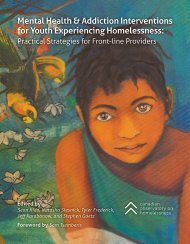COH-AWH-What_Would_it_Take
You also want an ePaper? Increase the reach of your titles
YUMPU automatically turns print PDFs into web optimized ePapers that Google loves.
1.1 POVERTY<br />
The journey into homelessness for many youth begins w<strong>it</strong>h childhood experiences of poverty.<br />
In add<strong>it</strong>ion to poor and precarious housing, youth discussed cycling in and out of family<br />
homelessness, trying to hide their poverty from their classmates, and experiencing neglect<br />
because caregivers simply couldn’t make ends meet. Multiple youth discussed going hungry<br />
regularly, repairing their clothing during art class, borrowing spare change from friends, or<br />
having to the use their school’s hot-glue gun to mend their shoes.<br />
These experiences of poverty preceded child<br />
welfare involvement for some, though several youth<br />
reported similar poverty and neglect in foster care.<br />
Poverty refers to the challenges people face when trying to meet their basic needs. Lack of<br />
adequate income is the basis of poverty, and can contribute to inadequate shelter, nutr<strong>it</strong>ional<br />
vulnerabil<strong>it</strong>y, and poor health and well-being. Though not all youth experienced poverty as children,<br />
poverty became a fairly universal experience once youth were kicked out or forced to leave home.<br />
In focus groups across the country, youth explained<br />
that lack of income was a key reason they became<br />
homeless or were unable to escape homelessness.<br />
“Especially recently,<br />
I’ve had to choose<br />
a lot between, like,<br />
getting functional<br />
clothing that isn’t torn<br />
to sh<strong>it</strong> and being able<br />
to buy food.”<br />
VANCOUVER YOUTH<br />
When asked what would have prevented their homelessness,<br />
youth from different backgrounds and regions frequently<br />
responded “a job,” “more income,” or “more employment<br />
opportun<strong>it</strong>ies.” For many, experiences of poverty were<br />
intergenerational and cyclical, making <strong>it</strong> difficult to rely on the<br />
resources of family or friends to escape.<br />
Youth identified three key drivers of poverty that need to be<br />
tackled in youth homelessness prevention efforts: (1) low social<br />
assistance rates, (2) systemic barriers to obtaining social assistance<br />
or employment, and (3) low wages and tight job markets.<br />
WHAT WOULD IT TAKE? 38
















